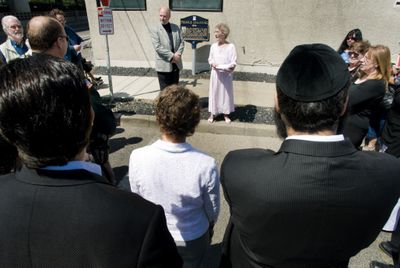Tribute marks historic temple

As monuments and markers go, this one is small and plain and tucked away in an unlikely location. But for the 35 people who gathered for its rededication June 25, it is large and important and symbolic.
It is the monument, in the form of a plaque, commemorating the original location of Temple Emanuel (originally Emanu-El), the first Jewish synagogue in Washington. It was built on Madison Street between Third and Fourth avenues, at the back of where the Downtown Lexus of Spokane dealership now stands, next to a freeway onramp.
The ceremony carried special meaning just before Independence Day.
The dignitaries gathered that day included Spokane Mayor Mary Verner; Spokane County Sheriff Ozzie Knezovich; Rabbi Yisroel Hahn of Spokane’s Chabad House; Karrie Brown, president of Spokane’s Temple Beth Shalom; the Rev. Dan Jarms of Faith Bible Church; Hilary Bernstein of the Anti Defamation League in Seattle, and representatives from assorted congressional and city offices.
Two of the dignitaries present merit special mention – Jerry Klinger of Rockville, Md., president of the Jewish American Society for Historic Preservation ( www.jashp.org), the nonprofit organization that provided the plaque; and Emily Sue Pike, who taught history for 30 years at North Central High School and who did the research for Klinger that provided the background leading his preservation group to donate the plaque.
It was the second time the organization stepped forth to do this. The first time was in 2004. But the plaque was vandalized this spring, apparently an anti-Semitic act, and Klinger stepped up to repair and rededicate it. The preservation society has erected many such markers in the country and constructed many commemorative sites across the world, including, in 2002, the permanent memorial to the Little Camp at Buchenwald concentration camp in Germany, where President Barack Obama spoke in June.
Knezovich told those assembled that we “need to remember we are not a Jewish community or a Christian community or any other kind of community. We are a whole community and won’t tolerate in this community acts that deface, harm or disrespect any of us.”
As America approaches Independence Day, Klinger said, it’s important to remember that many people came together to form this nation. For example, he said, Jews from Baltimore were among those defending Fort McHenry during the War of 1812.
During the same war, Klinger said, when Gen. Andrew Jackson called for volunteers, “white men, black men, red men … even the pirate Jean Lafitte answered the call.” Afterward, one injured volunteer, a Jewish man named Judah Touro, was nursed back to health by a Christian. Touro later became a wealthy man and was generous to his city of New Orleans and to his country. Klinger said Touro stepped in to pay the mortgage on a Christian church in the city just as the congregation was about to be evicted and gave the church to the parishioners.
That’s the American story, Klinger said. “We are great because of our universality, not our singularity.”
He said that shared heritage also has a home in Spokane, where Jews were in evidence as early as the 1870s. He noted that in the late 1880s, Spokane’s Jewish community had no permanent house of worship, but a Christian man donated a lot at Third and Madison so a temple could be built. Temple Emanu-El was dedicated at the site Sept. 14, 1892 – four days before Ohaveth Sholum Synagogue was opened in Seattle – making Spokane’s temple the first in the state. It was a frame building, 40 feet by 70 feet, with a stone foundation that cost $3,500, which was raised by donations. It stood at the site until 1934.
Temple Emanuel was a reform congregation, and in 1901 the city’s orthodox Jews formed their own congregation, Keneseth Israel, holding services at the Odd Fellows Hall until 1909, when they built their own structure at Fourth Avenue and Adams Street.
By 1920, Temple Emanuel was in disrepair, and the congregation built a large brick temple with a Roman classical design at Eighth Avenue and Walnut Street. At the front was an inscription that read “Have We Not All One Father.” The structure opened in 1928.
In 1966 the two Jewish congregations announced they would merge and set about building a new home at 30th Avenue and Perry Street. Temple Beth Shalom opened there in 1969. The building at Eighth and Walnut became, and remains, Plymouth Congregational Church – with the “Have We Not All One Father” statement still in place.
For more information, a history of Jewish Americans in Spokane is available at www.historylink.org (type “Spokane’s Jewish Community” on the search line).
At the rededication ceremony, Klinger said, “People who we do not know, people full of maliciousness and hate who do not treasure the special story of what it means to be an American, felt that damaging this simple marker was a statement of vandalism that would resonate against the Jews. The damaging of this marker is a statement against the citizens of Spokane, the state of Washington and the American way of life.
“We are gathered here to face ignorance, prejudice and hate as one people, to say we are Americans and we represent the best of America.”